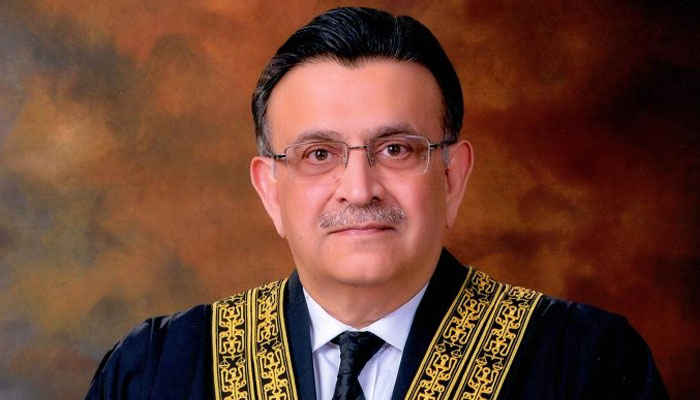Article 63 (A) ensures lawmakers' loyalty to party: CJP Umar Ata Bandial
SC's five-member bench hears presidential reference seeking interpretation of Article 63 (A)
April 20, 2022

- CJP Umar Ata Bandial says "loyalty basic constitutional principle".
- SC's five-member bench hears presidential reference seeking interpretation of Article 63 (A).
- PPP counsel Farooq Naek tells court that disqualification for next polls not written in Constitution.
ISLAMABAD: Chief Justice of Pakistan Umar Ata Bandial observed on Wednesday that the main aim of Article 63 (A) is to ensure a lawmaker’s “loyalty” to their party.
CJP Bandial passed the remarks during a hearing on the presidential reference seeking the interpretation of Article 63A of the Constitution of Pakistan. A larger bench of the apex court, headed by CJP Umar Ata Bandial, including Justice Munib Akhtar, Justice Ijaz Ul Ahsan, Justice Mazhar Alam Khan, and Justice Jamal Khan Mandokhel, heard the reference.
In today’s hearing, PPP's counsel Farooq Naek presented his arguments before the bench.
At the onset of the hearing, Naek explained to the bench that the 13th amendment was used to Abolish Article 58 2(B) but was restored by former dictator General (retd) Pervaiz Musharraf in 2002 via a Legal Framework Order.
“In 2010, 58 2(B) was abolished again via the 18th amendment and Article 63(A) was included via the 14th amendment,” the PPP’s counsel told the bench.
Naek explained to the court that under the 14th amendment, a party chairman was authorised with a lot of powers. The Election Commission of Pakistan (ECP) was not given the right to dismiss a decision made by the party chief, he added.
“Now, the ECP has the right to confirm the party chief's declaration if a lawmaker defects. The word disqualification was not used in any of the amendments made in Article 63(A),” said Naek.
The PPP’s counsel also explained to the court that the legislature retains the right to disqualify a member from Parliament and has not given the powers to the executive or the judiciary.
“In the 18th amendment, ECP has the right to decide on an Article 63(A) reference,” said Naek. He added that the presidential reference submitted before the court was not against Article 63(A).
“The presidential reference only relates to sub-section 4 of Article 63(A),” said Naek.
At this point, Justice Ijaz Ul Ahsan interjected and told the lawyer that Article 62 (1)(F) does not have a period for disqualification or un-seating. He also added that the Supreme court has interpreted the specific article.
To this, Naek told the judge that the lawmakers have not “determined disqualification” for a dissident legislator in Article 63(A).
Loyalty basic constitutional principle: CJP
At this point, CJP Bandial interjected to tell the PPP’s legal counsel that Article 63 (A) has made loyalty to one's party subject to the party's policy on four occasions. He also added that the then attorney general Khalid Jawed Khan was told by the court that the article is “related to party loyalty”.
“Loyalty is the basic constitutional principle. Article 5 states that every party member must be loyal to the state,” observed CJP Bandial.
The top judge also remarked that “disqualification” was a “normal thing” and that Article 63(A)’s main “aim is to ensure loyalty towards the party”.
“We have to look at the Constitution as a whole,” said CJP Bandial.
While Justice Ahsan observed that a lawmaker takes oath as a member of a party and is bound by those policies.
Party member not a slave: Naek
In response to Justice Ahsan’s comments, Naek told the court that a party lawmaker is “not a slave” that they have to follow every order.
However, Justice Ahsan wondered whether a government employee was also a slave. He added that “every party has certain rules and regulations which must be observed”.
On the other hand, Justice Munib Akhtar remarked that an MP is “sworn in as a party representative, not as an individual”
However, Naek, told the judges that no lawmaker takes an “oath to follow every order of the party chief”.
Justice Ahsan also observed that political parties are the “backbone” of a parliamentary system of government. He wondered how the system could be run if its “backbone is hit by cancer”.
To this, Naek told the bench that a dissident lawmaker is “unseated but not disqualified”.
Disqualification for next polls not written in Constitution: Naek
Upon hearing Naek’s comments, CJP Bandial observed that if “anyone is disqualified for dishonesty” then they are automatically “disqualified for the next elections”
“This is not written in the Constitution anywhere. Show this and I will leave the rostrum,” responded Naek.
The PPP’s legal counsel also told the court that loyalty is only seen in kingdoms and appealed to it to let the people decide who they want to elect.
At this, Justice Ahsan told Naek that Articles 62 and 63 should be removed from the Constitution then.
However, Naek maintained that “lifetime disqualification” could not be awarded to dissident lawmakers.
Why are dissident MPs taken back in a party? asks CJP
CJP Bandial observed that Article 63 (A) has only come under discussion at the apex court only once since 1998. He also added that this showed that the party chairmen did not take the article “seriously”.
“What is the reason that dissident members are taken back in the party?” asked the top judge.
The PPP’s legal counsel told the CJP, that the reason for this was that there is “flexibility in politics”, adding that a tough attitude leads to “anarchy”.
However, Justice Akhtar asked the lawyer if someone who is unseated can contest a “by-election”.
To this, Naek told the judge that a person can fight in a by-election, adding that a “dissident lawamker’s punishment is that they are unseated”.
At this point, Naek wrapped up the arguments and was appreciated by the CJP for giving “good arguments”.
“You have cleared all the doubts,” CJP told the PPP lawyer.
The CJP then told the courtroom that two questions lay before the Supreme Court.
“One question can be asked if vote was given against party or not? The second question maybe if there was a deviation from party lines. If voted against the policy, then court will decide something,” said the top judge.
At this, Senator Raza Rabbani asked for time from the court to respond to his questions in a hearing tomorrow.
The court, after hearing Senator Rabbani’s response, adjourned the hearing till tomorrow.











